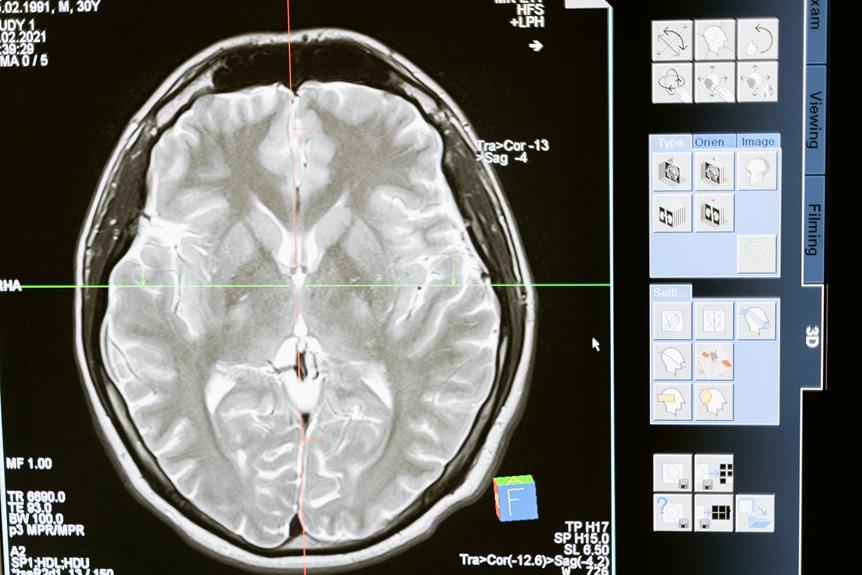If you've been wondering about the effects of long-term alcohol use on your brain health, this article is for you.
Research has shown that excessive alcohol consumption can lead to cognitive decline, memory loss, neurological disorders, impaired decision-making, and even alterations in brain structure.
By understanding the evidence-based impact of alcohol on the brain, you can make informed choices about your drinking habits and prioritize your long-term brain health.
Cognitive Decline
If you engage in long-term alcohol use, it can lead to cognitive decline. Studies have consistently shown that chronic alcohol consumption can have detrimental effects on cognitive function. One major consequence of long-term alcohol use is cognitive impairment, which refers to difficulties in thinking, memory, and problem-solving abilities.
Alcohol affects the brain by interfering with the communication between neurons, disrupting the normal functioning of neurotransmitters. This disruption can lead to structural and functional changes in the brain, particularly in regions responsible for learning and memory.
Research has demonstrated that individuals with a history of prolonged alcohol use exhibit deficits in various cognitive domains. These deficits can manifest as learning difficulties, making it harder to acquire new information or retain previously learned knowledge. Long-term alcohol consumption has been associated with impairments in attention, executive functioning, and information processing speed.
These cognitive impairments can have a profound impact on individuals' daily lives, affecting their ability to perform tasks that require cognitive skills, such as work or school-related activities.
Memory Loss
Long-term alcohol use negatively impacts brain health, particularly in relation to memory loss. Memory loss is a common consequence of chronic alcohol consumption, and it can significantly impair one's ability to remember and recall information. The effects of alcohol on memory are complex and multifaceted, involving both short-term and long-term memory processes.
Preventive measures play a crucial role in mitigating the risk of memory loss associated with long-term alcohol use. The most effective way to prevent memory impairment is to avoid excessive alcohol consumption altogether. Limiting alcohol intake and practicing moderation can help minimize the negative impact on cognitive function, including memory.
When it comes to treatment options, the first step is to address the underlying alcohol use disorder. Seeking professional help, such as counseling or rehabilitation programs, can aid in reducing alcohol consumption and preventing further memory decline. Additionally, cognitive rehabilitation techniques, such as memory exercises and strategies, may be beneficial for individuals experiencing alcohol-related memory loss.
Neurological Disorders
Neurological disorders can arise as a result of prolonged alcohol use. The impact of alcohol on the brain can lead to the development of neurodegenerative diseases, such as alcohol-related dementia and Wernicke-Korsakoff syndrome. These conditions are characterized by significant cognitive decline and memory impairment.
Studies have shown that chronic alcohol consumption can cause structural changes in the brain, including the shrinkage of certain brain regions and the loss of neurons. These changes contribute to the development of neurodegenerative diseases.
Alcohol abuse can also result in motor dysfunction, which is characterized by difficulties with coordination, balance, and movement control. Chronic alcohol consumption affects the cerebellum, a brain region responsible for motor function. Damage to the cerebellum can lead to unsteady gait, slurred speech, and tremors. The impairment of motor function can have significant consequences on an individual's daily functioning and quality of life.
It is important to note that the development and severity of neurological disorders can vary among individuals, depending on factors such as the amount and duration of alcohol use, genetic predisposition, and overall health. However, it's clear that prolonged alcohol use can have detrimental effects on brain health and increase the risk of developing neurodegenerative diseases and motor dysfunction.
Impaired Decision-Making
Chronic alcohol use can impair your decision-making abilities, potentially leading to detrimental consequences in various aspects of your life. When you regularly consume alcohol over an extended period, it can negatively impact your cognitive function, affecting your ability to make sound judgments and choices. Several risk factors contribute to the impairment of decision-making abilities in individuals who engage in long-term alcohol use:
- Brain damage: Prolonged alcohol consumption can lead to structural and functional changes in the brain, particularly in areas responsible for decision-making, such as the prefrontal cortex. These changes can disrupt the neural pathways involved in decision-making processes.
- Impaired judgment: Alcohol can impair your ability to assess risks accurately and make rational decisions. This can lead to engaging in dangerous behaviors, such as drunk driving or engaging in risky sexual activities, which can have severe consequences.
- Emotional regulation: Alcohol use can interfere with your emotional regulation abilities, making it harder to control impulsive behavior and make clear-headed decisions.
When it comes to treatment options, individuals struggling with impaired decision-making due to chronic alcohol use can benefit from various interventions:
- Detoxification and rehabilitation programs: These programs help individuals safely withdraw from alcohol use and provide support for long-term recovery.
- Cognitive-behavioral therapy (CBT): CBT can help individuals identify and modify negative thought patterns and behaviors associated with impaired decision-making, promoting healthier choices.
- Support groups and counseling: Engaging in support groups or individual counseling can provide a supportive environment and help individuals develop strategies to improve decision-making skills.
Altered Brain Structure
How does alcohol use affect your brain's structure over time?
Long-term alcohol use can lead to significant alterations in the structure of your brain. One of the key effects is a neurotransmitter imbalance, which refers to disruptions in the levels and functioning of important chemical messengers in the brain. Alcohol affects the neurotransmitters such as glutamate, GABA, and dopamine, which play crucial roles in various brain functions, including mood regulation, cognition, and reward processing. The chronic overconsumption of alcohol can disrupt the delicate balance of these neurotransmitters, leading to imbalances that can have detrimental effects on brain structure.
Another consequence of long-term alcohol use is decreased neuroplasticity, which refers to the brain's ability to change and adapt. Neuroplasticity is vital for learning, memory formation, and recovery from injury. Alcohol impairs neuroplasticity by disrupting the normal processes of synaptic plasticity, which involve the strengthening and weakening of connections between neurons. This can result in decreased cognitive function, impaired memory, and difficulties in learning new information.
- Overcoming Emotional Intimacy Challenges With Alcohol Misuse - November 18, 2023
- Overcoming Alcohol's Impact on Emotional Intimacy: 13 Essential Tips - November 18, 2023
- 6 Ways to Overcome Emotional Intimacy Challenges With Alcohol - November 18, 2023









